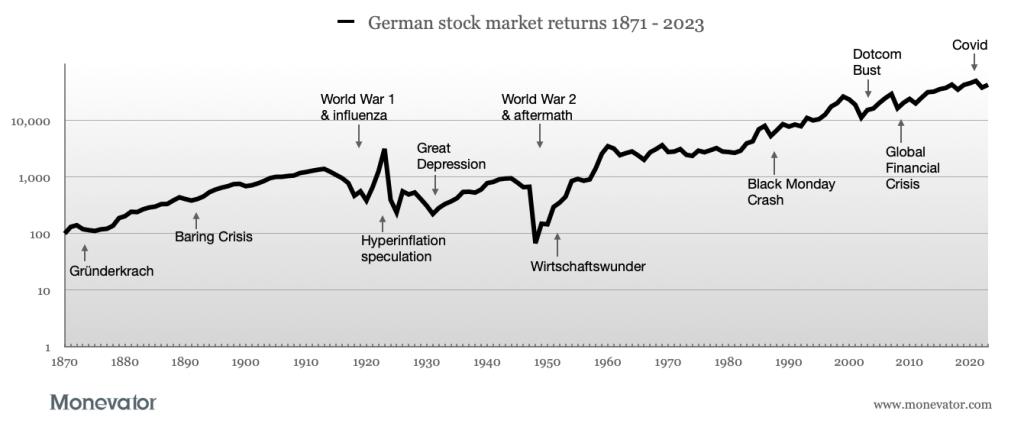
The tragedy of passive investing is that it’s a strategy that’s long on evidence but short on influencers. While crypto interests can deploy crack squads of A-Listers to win hearts, minds, and wallets, there aren’t any global megastars promoting index funds and posting about their “passion for dollar cost averaging”.
Except for one. Warren Buffett, The Oracle of Omaha, the MechGodzilla of Masterful Insight, and one of the greatest investors and entrepreneurs of all-time… that Warren Buffett has been telling anyone who’ll listen to get into index funds and stay there, since 1993:
By periodically investing in an index fund, for example, the know-nothing investor can actually out-perform most investment professionals. Paradoxically, when ‘dumb’ money acknowledges its limitations, it ceases to be dumb.
– Berkshire Hathaway shareholder letter 1993
And Buffett’s belief in the efficacy of passive investing has not wavered since:
In my view, for most people, the best thing to do is to own the S&P 500 index fund. People will try and sell you other things because there’s more money in it for them if they do.
– Berkshire Hathaway Annual Shareholder Meeting 2020, CNBC
In between times, Buffett’s candour on the challenges of investing, and his gentle pointers on how to resolve them, amount to the best and most authoritative guidance on managing your own portfolio that you’ll ever read.
Two countries separated by a common language: Buffett talks from a US perspective, hence he always mentions a US S&P 500 index fund as his tracker of choice. We recommend that UK investors think from a global perspective and go for a global tracker fund.
Why passive investing?
Here’s Buffett’s brief explanation that strikes at the heart of the passive vs active investing debate:
A lot of very smart people set out to do better than average in securities markets. Call them active investors. Their opposites, passive investors, will by definition do about average. In aggregate their positions will more or less approximate those of an index fund.
Therefore, the balance of the universe—the active investors—must do about average as well. However, these investors will incur far greater costs. So, on balance, their aggregate results after these costs will be worse than those of the passive investors.
– Berkshire Hathaway shareholder letter 2016
Here’s the TL;DR version:
I think that the people who buy those index funds, on average, will get better results than the people that buy funds that have higher costs attached to them, because it’s just a matter of math.
– Berkshire Hathaway Annual Shareholder Meeting 2002, CNBC
Low costs make all the difference
It takes a huge leap of faith on the part of a new investor to believe that cheaper really is better.
Surely a field of human endeavour that attracts the brightest and the best can’t be dominated by ‘supermarket own-brand’ products such as index trackers?
Frankly, you couldn’t wish to hear the truth from a greater source of integrity than Buffett:
Costs skyrocket when large annual fees, large performance fees, and active trading costs are all added to the active investor’s equation.
Funds of hedge funds accentuate this cost problem because their fees are superimposed on the large fees charged by the hedge funds in which the funds of funds are invested.
A number of smart people are involved in running hedge funds. But to a great extent their efforts are self-neutralizing, and their IQ will not overcome the costs they impose on investors. Investors, on average and over time, will do better with a low-cost index fund than with a group of funds of funds.
– Berkshire Hathaway shareholder letter 2016
Forget picking stock market winners and losers
Granted, it’s a blow to the ego – but Buffett also cautions you against backing your own smarts:
The goal of the non-professional should not be to pick winners – neither he nor his ‘helpers’ can do that – but should rather be to own a cross-section of businesses that in aggregate are bound to do well. A low-cost S&P 500 index fund will achieve this goal.
– Berkshire Hathaway shareholder letter 2013
The ‘helpers’ Buffett mentions are the ranks of advisors, organisations, and journalists whose livelihoods depend on gulling you into thinking you can gain an edge:
Wall Street makes money on — one way or another — catching the crumbs that fall off a table of capitalism and an incredible economy that, you know, nobody could’ve ever dreamed of a couple hundred years ago.
But they don’t make money unless people do things (laughs) and if they get a piece of them.
And they make a lot more money when people are gambling than when they’re investing. It’s much better to have somebody that’s going to trade 20 times a day and get all excited about it, just like pulling the handle on a slot machine.
– Berkshire Hathaway Annual Shareholder Meeting 2022, CNBC
Many people confuse patient investing (doing everything to tip the odds in your favour over the long-run) with speculation (the impulse to get rich quick).
Buffet warns:
The main danger is that the timid or beginning investor will enter the market at a time of extreme exuberance and then become disillusioned when paper losses occur. (Remember the late Barton Biggs’ observation: “A bull market is like sex. It feels best just before it ends.”)
The antidote to that kind of mistiming is for an investor to accumulate shares over a long period and never sell when the news is bad and stocks are well off their highs.
Following those rules, the ‘know-nothing’ investor who both diversifies and keeps his costs minimal is virtually certain to get satisfactory results.
Indeed, the unsophisticated investor who is realistic about his shortcomings is likely to obtain better long-term results than the knowledgeable professional who is blind to even a single weakness.
– Berkshire Hathaway shareholder letter 2013
The remedy is simple:
So I would pick a broad index, but I wouldn’t toss a chunk in at any one time. I would do it over a period of time, because the very nature of index funds is that you are saying, I think America’s business is going to do well over a – reasonably well – over a long period of time, but I don’t know enough to pick the winners and I don’t know enough to pick the winning times.
– Berkshire Hathaway Annual Shareholder Meeting 2002, CNBC
Buffett on active management
It’s entirely natural to believe we can buy in an expert to solve our problems. Indeed, Buffett agrees that outperforming active managers exist.
It’s just the odds are stacked against you finding one of the few:
The problem simply is that the great majority of managers who attempt to over-perform will fail. The probability is also very high that the person soliciting your funds will not be the exception who does well.
Further complicating the search for the rare high-fee manager who is worth his or her pay is the fact that some investment professionals, just as some amateurs, will be lucky over short periods.
If 1,000 managers make a market prediction at the beginning of a year, it’s very likely that the calls of at least one will be correct for nine consecutive years. Of course, 1,000 monkeys would be just as likely to produce a seemingly all-wise prophet.
But there would remain a difference: The lucky monkey would not find people standing in line to invest with him.
Finally, there are three connected realities that cause investing success to breed failure. First, a good record quickly attracts a torrent of money. Second, huge sums invariably act as an anchor on investment performance: What is easy with millions, struggles with billions (sob!). Third, most managers will nevertheless seek new money because of their personal equation – namely, the more funds they have under management, the more their fees.
The bottom line: When trillions of dollars are managed by Wall Streeters charging high fees, it will usually be the managers who reap outsized profits, not the clients. Both large and small investors should stick with low-cost index funds.
– Berkshire Hathaway shareholder letter 2016
Confidence trick
Buffett has a theory that helps explain why successful people often find it hard to heed his passive investing advice:
Over the years, I’ve often been asked for investment advice, and in the process of answering I’ve learned a good deal about human behavior. My regular recommendation has been a low-cost S&P 500 index fund. To their credit, my friends who possess only modest means have usually followed my suggestion.
I believe, however, that none of the mega-rich individuals, institutions, or pension funds has followed that same advice when I’ve given it to them. Instead, these investors politely thank me for my thoughts and depart to listen to the siren song of a high-fee manager or, in the case of many institutions, to seek out another breed of hyper-helper called a consultant.
That professional, however, faces a problem. Can you imagine an investment consultant telling clients, year after year, to keep adding to an index fund replicating the S&P 500? That would be career suicide. Large fees flow to these hyper-helpers, however, if they recommend small managerial shifts every year or so. That advice is often delivered in esoteric gibberish that explains why fashionable investment ‘styles’ or current economic trends make the shift appropriate.
The wealthy are accustomed to feeling that it is their lot in life to get the best food, schooling, entertainment, housing, plastic surgery, sports ticket, you name it. Their money, they feel, should buy them something superior compared to what the masses receive.
In many aspects of life, indeed, wealth does command top-grade products or services. For that reason, the financial ‘elites’ – wealthy individuals, pension funds, college endowments and the like – have great trouble meekly signing up for a financial product or service that is available as well to people investing only a few thousand dollars.
This reluctance of the rich normally prevails even though the product at issue is – on an expectancy basis – clearly the best choice.
– Berkshire Hathaway shareholder letter 2016
This matters because the rest of society instinctively turns to the ultra-successful for its social cues. Buffett counsels against this course:
Human behavior won’t change. Wealthy individuals, pension funds, endowments and the like will continue to feel they deserve something ‘extra’ in investment advice. Those advisors who cleverly play to this expectation will get very rich. This year the magic potion may be hedge funds, next year something else.
The likely result from this parade of promises is predicted in an adage: “When a person with money meets a person with experience, the one with experience ends up with the money and the one with money leaves with experience.“
– Berkshire Hathaway shareholder letter 2016
Don’t panic!
Buffett is at his most reassuring when he reminds us that we can withstand future investing storms:
American business – and consequently a basket of stocks – is virtually certain to be worth far more in the years ahead. Innovation, productivity gains, entrepreneurial spirit, and an abundance of capital will see to that.
Ever-present naysayers may prosper by marketing their gloomy forecasts. But heaven help them if they act on the nonsense they peddle. Many companies, of course, will fall behind, and some will fail. Winnowing of that sort is a product of market dynamism.
Moreover, the years ahead will occasionally deliver major market declines – even panics – that will affect virtually all stocks. No one can tell you when these traumas will occur – not me, not Charlie, not economists, not the media. Meg McConnell of the New York Fed aptly described the reality of panics: “We spend a lot of time looking for systemic risk; in truth, however, it tends to find us.”
During such scary periods, you should never forget two things: First, widespread fear is your friend as an investor, because it serves up bargain purchases. Second, personal fear is your enemy. It will also be unwarranted. Investors who avoid high and unnecessary costs and simply sit for an extended period with a collection of large, conservatively-financed American businesses will almost certainly do well.
– Berkshire Hathaway shareholder letter 2016
One of the good guys
Buffett has long played the public role of an aging Good Wizard who reminds us that it’s not impossible for a fundamentally decent person to rise to the top.
(And also that not every multi-billionaire has to spend their fortune on sending steel cocks into space. But I digress.)
To return to Buffett’s less celebrated role as a passive investing guru, I have one final quote for you that provides the strategic bedrock upon which to build a successful investment strategy:
You don’t need to be an expert in order to achieve satisfactory investment returns. But if you aren’t, you must recognize your limitations and follow a course certain to work reasonably well. Keep things simple and don’t swing for the fences. When promised quick profits, respond with a quick ‘no.’
– Berkshire Hathaway shareholder letter 2013
Take it steady,
The Accumulator
The post Warren Buffett explains why passive investing is a winning strategy appeared first on Monevator.



